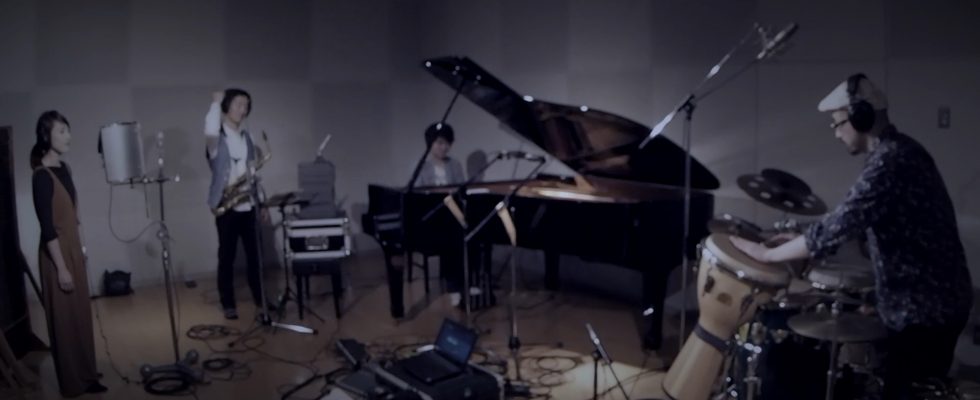‘the Mountain with No Name’ by Kaoru Tsubakida
Kaoru Tsubakida (As)
Akane Nakagaki (Voice)
Shota Watanabe (Pf)
Yoshitaka Yamashita (Per)
Kaoru Tsubakida
Born in 1964, Iwami, Tottori Prefecture, Kaoru Tsubakida started playing jazz when he attended Nihon Fukushi University. He studied jazz theory with Toshihisa Morita, taking saxophone lessons from Akira Omori and Masato Kumoi.
During 1992, Tsubakida participated in many jam sessions in New York City, and was greatly inspired by musicians such as Atsushi Ikeda,Yosuke Inoue and Shingo Okuda. In 2001 he performed in the Seattle Year Shot Jazz Festival as a member of the C.U.G.Jazz Orchestra.
At present, he has released four albums; ‘Make It So’ (2004), ‘Color Scheme’ (2008), ‘The Cloudless Sky’ (2012), and ‘The Mountain With No Name’ (2016).
Tsubakida also teaches the saxophone, many of his students becoming professional musicians.
Kaoru Tsubakida currently plays as a member of the Shuhei Mizuno Big Band and Kenny’s All Stars Big Band, as well as his own group.
Akane Nakagaki
Akane Nakagaki was born in 1982, Toyota City, Aichi Prefecture.
Akane started her musical career in the Tokai area in 2004. In February 2008, she released her first album “Yes”, on What’s New Records label. The album was nominated for the 2008 Jazz Disk Award in Swing Journal Magazine. In August of the same year, she participated in “Jazz vocal showcase VOL.1” released on Grace’s Notes Records.
In June 2011, Akane’s second album “River” was released from What’s New Records. Later the same year, she performed at Nagoya Blue Note.
Akane provided vocals for KASH’s album, ‘EVER FLOW’ in 2012. She also participated in the Kaoru Tsubakida Band, taking part in and his third album, “Cloudless Sky” in July 2012, and fourth album, “The mountain with no name” in September 2016.
Akane Nakagaki released her newest album “Lost Generation”, from What’s New Records in April 2017. She currently performs at many festivals and jazz street events nationwide, in addition to providing jingles for Japanese commercials.
Shota Watanabe
Shota Watanabe was born in Nagoya, Japan in 1988. He grew up with the musical influence of his father, also a great guitarist, Norio Watanabe. He started studying classical piano from the age of four. When Shota was sixteen years old, he started to take jazz lessons from Donny Schwekendiek, to polish up his improvisation skill.
Watanabe started playing music in public with the jazz funk band ‘Akamon’ in 2005. He participated many jazz bands, such as the Wataru Hamazaki Quartet, Kaoru Tsubakida Quintet, Hideaki Kanazawa Trio, and Noon band.
In 2010, Shota participated in the recording for the album “Once upon the summer time” by Japanese singer “Noon”, and in 2012 he made his first appearance at Blue Note Nagoya as a member of Noon’s band.
Shota currently performs with his own band, in addition to providing musical support in a wide range of music genres to various other artists, mainly in the Tokyo and Nagoya areas of Japan, as well as nationwide.
Yoshitaka Yamashita
Yamashita started playing drums when he was in high school. He attended Nagoya University. While at university, he joined a jazz big band and started playing jazz. He attended the Drummers Collective in New York, after graduating university. He studied various musical styles of drum set and percussion at the school.
Upon returning to Japan, Yamashita joined the club-jazz band ‘native’ and released six CDs and one EP. After leaving the band, he joined many sessions and bands.
As a member of the piano trio ‘Dear Blues’, he played at the “Festival eclats d’Email” in 2013 in Limoges, France. The trio released their most recent album ‘La Mesha’ in 2016.
Yamashita toured Italy in 2014 as a member of the band ‘TRISPACE’ and recorded in Sweden. In 2015, the band released their newest album ‘Nightfall’.
In 2016, Yamashita participated in Kaoru Tsubakida’s album ‘Mountain with No Name’ and following nationwide tour in Japan.
Yoshitaka Yamashita currently performs with a number of regular bands, in addition to various sessions and recordings in a wide range of music genres.
